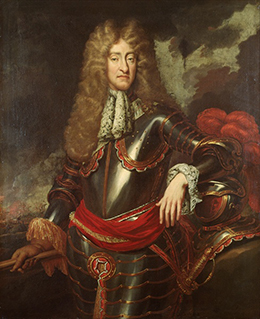| << Chapter < Page | Chapter >> Page > |
During the brief rule of King James II, many in England feared the imposition of a Catholic absolute monarchy by the man who modeled his rule on that of his French Catholic cousin, Louis XIV. Opposition to James II, spearheaded by the English Whig party, overthrew the king in the Glorious Revolution of 1688–1689. This paved the way for the Protestant reign of William of Orange and his wife Mary (James’s Protestant daughter).
King James II ( [link] ), the second son of Charles I, ascended the English throne in 1685 on the death of his brother, Charles II. James then worked to model his rule on the reign of the French Catholic King Louis XIV, his cousin. This meant centralizing English political strength around the throne, giving the monarchy absolute power. Also like Louis XIV, James II practiced a strict and intolerant form of Roman Catholicism after he converted from Protestantism in the late 1660s. He had a Catholic wife, and when they had a son, the potential for a Catholic heir to the English throne became a threat to English Protestants. James also worked to modernize the English army and navy. The fact that the king kept a standing army in times of peace greatly alarmed the English, who believed that such a force would be used to crush their liberty. As James’s strength grew, his opponents feared their king would turn England into a Catholic monarchy with absolute power over her people.

In 1686, James II applied his concept of a centralized state to the colonies by creating an enormous colony called the Dominion of New England . The Dominion included all the New England colonies (Massachusetts, New Hampshire, Plymouth, Connecticut, New Haven, and Rhode Island) and in 1688 was enlarged by the addition of New York and New Jersey. James placed in charge Sir Edmund Andros, a former colonial governor of New York. Loyal to James II and his family, Andros had little sympathy for New Englanders. His regime caused great uneasiness among New England Puritans when it called into question the many land titles that did not acknowledge the king and imposed fees for their reconfirmation. Andros also committed himself to enforcing the Navigation Acts, a move that threatened to disrupt the region’s trade, which was based largely on smuggling.
In England, opponents of James II’s efforts to create a centralized Catholic state were known as Whigs. The Whigs worked to depose James, and in late 1688 they succeeded, an event they celebrated as the Glorious Revolution while James fled to the court of Louis XIV in France. William III (William of Orange) and his wife Mary II ascended the throne in 1689.
The Glorious Revolution spilled over into the colonies. In 1689, Bostonians overthrew the government of the Dominion of New England and jailed Sir Edmund Andros as well as other leaders of the regime ( [link] ). The removal of Andros from power illustrates New England’s animosity toward the English overlord who had, during his tenure, established Church of England worship in Puritan Boston and vigorously enforced the Navigation Acts, to the chagrin of those in port towns. In New York, the same year that Andros fell from power, Jacob Leisler led a group of Protestant New Yorkers against the dominion government. Acting on his own authority, Leisler assumed the role of King William’s governor and organized intercolonial military action independent of British authority. Leisler’s actions usurped the crown’s prerogative and, as a result, he was tried for treason and executed. In 1691, England restored control over the Province of New York.

Notification Switch
Would you like to follow the 'U.s. history' conversation and receive update notifications?